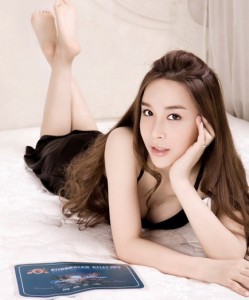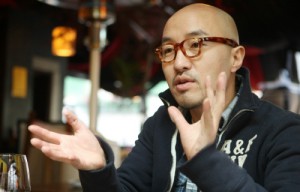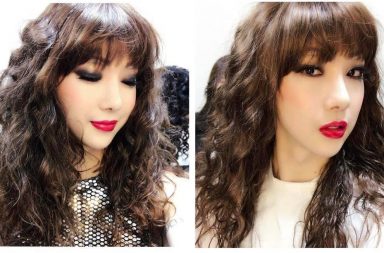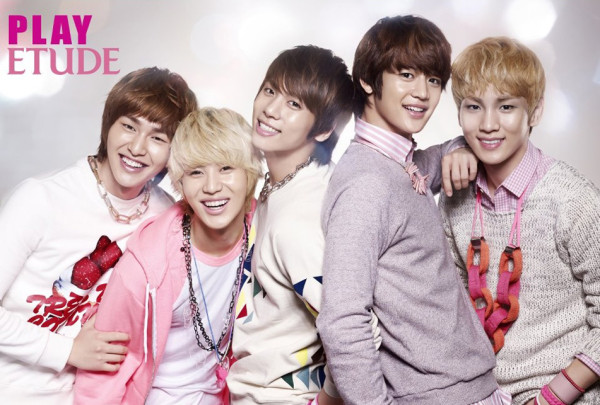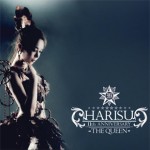 After 5 years out of the music scene, Harisu has recently made her comeback with the mini-album The Queen. Marking exactly 11 years after her debut, Korea’s first transgender entertainer comes back with an electro-disco album consisting on three tracks. And Harisu is determined to make the title track, “Shopping Girl,” the next overly auto-tuned song of the summer.
After 5 years out of the music scene, Harisu has recently made her comeback with the mini-album The Queen. Marking exactly 11 years after her debut, Korea’s first transgender entertainer comes back with an electro-disco album consisting on three tracks. And Harisu is determined to make the title track, “Shopping Girl,” the next overly auto-tuned song of the summer.
Harisu became famous in 2001, after her appearance in an infamous cosmetics commercial for the brand DoDo. She had done some small TV appearances as a boy before having the gender reassignment surgery in the late 1990’s. Contrary to the expected, the DoDo campaign, which had a special emphasis in her condition as a transsexual, was a huge success. She was immediately labeled as “more beautiful than a woman,” and within one year from her debut, she starred a television documentary about her life on KBS, got a leading role in the movie Yellow Hair 2, published her autobiography Eve from Adam, featured in a Turbo MV and even released her first album, Temptation.
In 2004 she set up her own company, G&F Entertainment, and also that year she started her activities overseas, mainly in Taiwan, China and Malaysia, with dramas, advertisements, movies and albums in Mandarin. Harisu released five albums before going to a 5-year hiatus that she now breaks with the release of The Queen.
She was also the second transgender in Korea who was able to legally have her sex changed, and in 2007 she married rapper Micky Jung and had the wedding preparations followed by a reality television show. Although she admitted in 2008 that she still faced some discrimination inside the industry, her career has been arguably successful despite her condition as a transsexual. This fact can be surprising considering the conservatism of Korean society and the previous case of Hong Seok-cheon.
Hong Seok-cheon, known actor and comedian, openly admitted being gay in 2000. He was immediately fired by both MBC and SBS. He was able to come back to television in 2001, although the job offers were much smaller, leading him to start anew and open his own restaurant. He has since slowly made his comeback to the entertainment business, but the industry is still reluctant to take him back.
What’s the difference between Harisu’s and Hong Seok-cheon’s careers, then? Well, firstly, Harisu not only debuted as a declared transsexual, but she made a marketing strategy out of it. Hong Seok-cheon, however, was already a well-known actor before coming out. Besides, the transgender and transvestite culture seems to be traditionally associated to the entertainment business, and even if not directly related, the flower boy culture in Korea somehow makes effeminate men – or, as Harisu herself, “more beautiful than women” — socially acceptable. Most of Harisu troubles seemed to be linked to legal or personal issues; her anti-fan café, for example, didn’t have as many members as the anti-fan cafés of some of the top idol groups. But Harisu’s popularity and seemingly acceptance has been seen as a sign that Korea’s Confucian society is becoming increasingly liberal; how does Hong Seok-cheon’s case fit there then?
The marketing of Harisu’s image as a transsexual from the very beginning is somehow tricky too. Yes, Harisu has probably raised awareness on transgenders in Korea and helped social acceptance, and mostly with positive effects. But on the other hand, she will also be forever marketed as Korea’s first transsexual in the entertainment business. Not only will she not be able to get rid of the ‘transsexual’ label – not that she’s ashamed, of course, she opened a transgender club in Seoul in 2009 and has publically supported the cause – but, let’s face it, being transsexual is her most powerful marketing strategy. Take for example her first commercial, where she had her Adam’s apple digitally added (since she didn’t have it herself). She used this act as a way to clearly state from the beginning that she was indeed transsexual, as she herself stated that “It’s better to make it clear from the start”. And indeed it is, if we take a look at Hong Seok-cheon’s case. But how long will she have to live under that image? Yes, she’s a transgender. But she’s a woman too. And she’s pretty much aware of this typecasting, as it was one of the reasons she alleged to promote overseas for some years.
On the other hand, her image as a woman does not really question those Confucian values she struggles with. She has described herself as “not only as fully a woman but as seeking to live up to the traditional Korean ideal of womanhood”, and also declared before marrying that “To my boyfriend, I behave as would be expected of a ‘wise mother and good wife’.” Harisu has from the beginning sold and image of over-femininity and beauty, and probably because of that the general public seems to have accepted her easily.
Has Harisu have a positive effect in the opening of Korean society towards transgender? Most definitely, yes. Just her presence in the media makes it unavoidable for Korean society to continue denying their existence. And even though Hong Seok-cheon is the opposite to an example of Korea’s progressive openness, the situation is now not the same as when he came out – most probably thanks to him, among other reasons. But assuming the fact that Korean society has accepted Harisu as a sign of a drastic change in its mentality is probably… well, too much of an assumption.
(Davies, Gloria; Davies, M E; Cho, Young-A, Hallyu ballyhoo and Harisu: Marketing and representing the transgendered in South Korea (Melbourne: Monash University ePress, 2010); Sanders, Douglas, Mujigae Korea (2009); LA Times)
